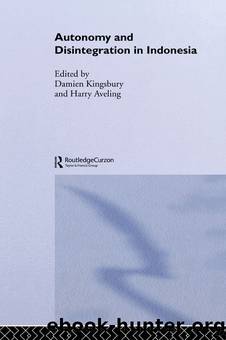Autonomy & Disintegration Indonesia by Damien Kingsbury & Harry Aveling

Author:Damien Kingsbury & Harry Aveling [Kingsbury, Damien & Aveling, Harry]
Language: eng
Format: epub
ISBN: 9781136001901
Goodreads: 17136451
Publisher: Routledge
Published: 2004-11-11T00:00:00+00:00
EAST TIMOR
Of all the dissatisfaction with incorporation into the Republic of Indonesia, East Timor was by far the best known case before it eventually achieved separation in October 1999. Yet even this separation, only very reluctantly agreed to by Indonesia, was only achieved after the intervention of a multilateral peace enforcement mission under the auspices of the UN and led by Australia. This followed a ballot on self-determination on 30 August 1999 that overwhelmingly (78.5 per cent of the 98 per cent of eligible voters) rejected Indonesian rule in the territory (Martin 1999).
The most important aspect of the East Timor question had always been that, according to the UN, East Timor had never been a part of Indonesia, but was occupied by Indonesia in contravention of repeated UN calls for it to withdraw. Most of the international community and the UN regarded the occupation of East Timor by Indonesia as illegal. As such, it was legitimate to identify the East Timor issue not as a matter between a province and the state, but as a matter between a state and a territory that had the status of a colony.9 However, from an Indonesian perspective, from 1976 until 1999, East Timor was a province of the state, known as Timor Timur, and before the self-determination ballot it was difficult to find, even among Indonesians opposed to New Order policy on East Timor, an acceptance of the idea that East Timor could or should be entirely independent. In the post-ballot period views across Indonesia on East Timor were mixed, although many still seemed to believe that the territory should be a part of Indonesia and that the UN had somehow and for some reason conspired to rig the ballot to âstealâ the territory away from Indonesia. The âlossâ of East Timor hurt the ânationalistâ pride of many Indonesians, in particular many political leaders, and helped lead to the creation of a more stridently ânationalistâ group within Indonesiaâs political elite.
The history of East Timor was a sad one, in particular from the Indonesian invasion of December 1975. However, prior to the invasion, East Timor had a long history as a neglected Portuguese colonial backwater (see Kingsbury 2000: 17â27), in which the indigenous population was treated as little more than serfs within a feudal political structure. The collapse of the Portuguese empire, however, in 1974â75, following a revolution in Portugal, led to the development of political parties ahead of what was assumed would be independence. Members of the Indonesian government at that time, in particular in the military, saw the collapse of the Portuguese empire as an opportunity for expanding the Indonesian state by incorporating what was widely seen to be a colonial anomaly (similar, in some senses, to the Portuguese colony of Goa, which was incorporated into India). However, the movement for East Timorese independence was in large part fuelled by a leftist ideology, which put it in direct opposition to the stridently right-wing New Order government. Indeed, this only hardened the resolve
Download
This site does not store any files on its server. We only index and link to content provided by other sites. Please contact the content providers to delete copyright contents if any and email us, we'll remove relevant links or contents immediately.
| Africa | Americas |
| Arctic & Antarctica | Asia |
| Australia & Oceania | Europe |
| Middle East | Russia |
| United States | World |
| Ancient Civilizations | Military |
| Historical Study & Educational Resources |
Machine Learning at Scale with H2O by Gregory Keys | David Whiting(4313)
Never by Ken Follett(3958)
Fairy Tale by Stephen King(3400)
Oathbringer (The Stormlight Archive, Book 3) by Brandon Sanderson(3217)
The Man Who Died Twice by Richard Osman(3081)
Will by Will Smith(2922)
Rationality by Steven Pinker(2367)
Can't Hurt Me: Master Your Mind and Defy the Odds - Clean Edition by David Goggins(2343)
The Dark Hours by Michael Connelly(2311)
Friends, Lovers, and the Big Terrible Thing by Matthew Perry(2231)
The Dawn of Everything: A New History of Humanity by David Graeber & David Wengrow(2210)
Principles for Dealing With the Changing World Order: Why Nations Succeed and Fail by Ray Dalio(2055)
A Short History of War by Jeremy Black(1849)
HBR's 10 Must Reads 2022 by Harvard Business Review(1846)
Go Tell the Bees That I Am Gone by Diana Gabaldon(1758)
A Game of Thrones (The Illustrated Edition) by George R. R. Martin(1750)
Kingdom of Ash by Maas Sarah J(1684)
515945210 by Unknown(1668)
443319537 by Unknown(1560)
